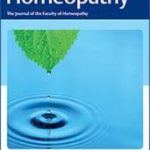Vesna Dragicevic, Mihajlo Spasic, Milena Simic, Zoran Dumanovic and Bogdan Nikolic
Stimulative influence of germination and growth of maize seedlings originating from aged seeds by 2,4-D potencies
Homeopathy, 2013, 102 (3), 179-186

Background - The 2,4-D (2,4-dichlorophenoxyacetic acid) is using as a growth regulator in tissue culture media. Maize seeds have poor ability to maintain germination rate in the long term.Objective - To examine the possible restorative effect of homeopathic 2,4-D potencies on maize seedlings originating from seeds damaged by accelerated aging.Methods - Seeds of four maize lines were subjected to accelerated aging stress treatment. Seed samples were treated with distilled water (control) and a range of potencies of 2,4-D: 3C, 3.75C, 4.5C, 5.25C and 6C. The germination capacity, fresh substance (FS) and length of root and shoot were determined. Hydrolysis and biosynthesis, GSH/GSSG ratio and redox capacity were calculated.Results - Induced seed aging decreased germination rate and growth of seedlings. 2,4-D potencies did not have a statistically significant effect on germination. However, there were statistically significant effects on FS production, root and shoot length and redox capacity. The 3C potency had the largest effect on the FS accumulation, 4.5C increased root and shoot length, compared to control (statistically significant). The GSH/GSSG ratio and the redox capacity were decreased by aging. The 3C and 4.5C potencies tended to reverse the GSH/GSSG ratio (statistically significant) in the root and shoot, (i.e., shifted the redox balance to the reduced state).Conclusion - Homeopathic potencies of 2,4-D appear to have a beneficial effect on artificially aged maize seeds: they stimulate growth through better substance conversion from seed rest, and shift the redox capacity towards a reduced environment. Further work is required to determine if this is an useful means of improving maize seed germination and growth.





